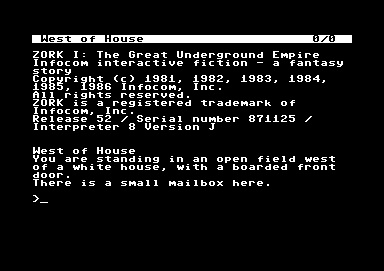 |
| "Adventure" for Atari 2600 by Warren Robinett |
Everyone thinks of the original "Space Invaders" and blocky Atari graphics and how they've morphed and evolved into the near-photorealism of modern sports simulations and various military shooters.
But it really all started with text adventures - both for me, and for the industry as a whole.
I don't talk about it much, but I'm a video gamer. (To clarify, I am not a "console gamer" - one of those be-hatted bros screaming into an XBox headset during Halo matches. I build my own high-performance custom PCs for 2 reasons: audio recording and gaming.)
I always liked playing board games. It was a true family activity. I remember my Dad spending free time when I was a kid doing all sorts of elaborate puzzles and games - map rallys, complex strategy games with tablecloth-sized paper maps and rulebooks as thick as novels, Go, and more.
My father was one of the founders of a consulting company. One of the innovations they brought to the field was early adoption of computer systems for word processing, accounting, and more. Dad usually worked at least a half-day on Saturdays. My brother and I would frequently accompany him to his office.
Being a kid fascinated with technology, I quickly discovered the green-screen Wang terminals...and then found the "Games" menu. Most of them were pretty lame, even by early 80s standards.
But one of those games was called "Adventure". When you ran it, instead of seeing graphics, you saw this:
AT END OF ROAD
You are standing at the end of a road before a small brick building. Around you is a forest. A small stream flows out of the building and down a gully.You navigated by telling the game what you wanted to do: "Enter Building". "Look around". "Get lamp". It was fascinating - like being inside a book. Part of the challenge was solving puzzles. Part of the challenge was trying to figure out what commands would actually work.
This was "Colossal Cave Adventure", and was apparently ported to the Wang mainframe by someone. Once I found that game, I couldn't wait to go to Dad's office on the weekend. I grew frustrated with my slow typing, and vowed one day I would learn to touch-type super-fast just so I could play these games.
Not long after, our family purchased an Apple ][ computer, and managed to get a copy of "Zork" - a different take on Colossal Cave Adventure by a company called Infocom. My father, brother, and I would go on to play nearly every single one of Infocom's games.
Infocom's games were perfect - fun, inventive, and daring. They made several sequels to Zork (for better or worse establishing the gaming industry tradition of multiple sequels and brand names).
The packaging was sublime, both as a means of encouraging sales and discouraging piracy - some games required some of the pieces inside the box.
Infocom started in the middle of 1979, and quickly expanded to write "text adventures" in nearly every literary genre.
They made a murder mystery ("Deadline"), which came with "detective files". They made a science fiction game ("Starcross") that came in a 12" white plastic flying saucer. They made an "adult" sci-fi pulp game called "Leather Goddesses of Phobos". Perhaps best of all, they made a game called "Suspended" (one of the most inventive and challenging), whose box was a striking white face.
Some games were hilarious comedies ("Planetfall", "Hitchhiker's Guide To The Galaxy"). Some were deadly serious. Some were mind-expanding. Most were some combination of the three.
Nearly every one was a fantastic experience, challenging, fun, and occasionally emotionally touching.
I played them for hours. I made maps. I walked around during the day trying to come up with puzzle solutions. I even tried programming a few games of my own.
By 1989, it was over. Infocom closed.
Rather than following a literary tradition of addressing the imagination directly, games have chosen the quick hit of ever-fancier graphics (they hit the limits of sonic realism about a decade ago).
It's easy to be amazed by the near-photorealistic graphics of the latest shooter or sports simulation, but ultimately even stereoscopic 3D photorealism is lacking. There's no smell, for example. No texture. No temperature. No humidity. And because the graphics are so arresting, you seldom stop to think about or imagine these things.
 |
| Skyrim by Bethesda Softworks - the latest in 3D graphic adventure |
Art leaves room for the audience, and I suppose that's part of the power of the written word.
I've played a lot of visually striking games, some quite beautiful. I have had dreams where I wander the virtual spaces I've explored in them. But I've never had a graphically pretty game make me cry the way I did near the end of one of the best Infocom games.
"We didn't spend enough time thinking about how lucky we were...we kind of assumed 'Oh this is what it will always be like...this is going to go on forever'. Much like youth itself..."All that said, I also find it incredibly difficult to go back to these games now, simply because they are so slow, and require such a controlled and deliberate play style. They're not immediately satisfying, and in some ways, they're not even "fun". Many of them give you the same brain itch the Sunday crossword in the New York Times does.
But like many other childhood experiences perhaps best remembered than revisited, I think of them and their impact often.
It is dark. You are likely to be eaten by a grue.
You can play Zork (and many other Infocom games) online for free, or find apps for your smartphone.
The entirety of "Get Lamp", a documentary about Infocom and text adventures, is on YouTube:


